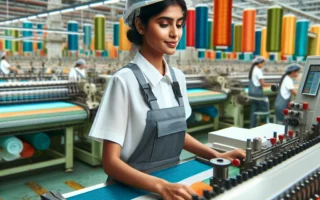The Impact of Technology on Sustainable Fashion
Technology has been at the forefront of revolutionizing sustainable clothing practices, playing a pivotal role in transforming the fashion industry. With the advent of innovative solutions, such as 3D printing, advanced recycling technologies, and digital supply chain platforms, the impact of technology on sustainable fashion is undeniable. These technological advancements have enabled the creation of eco-friendly materials, streamlined production processes, and enhanced transparency throughout the supply chain.
3D printing has emerged as a game-changer in sustainable fashion, offering the ability to produce clothing items with minimal waste generation. By utilizing this technology, designers can optimize material usage and create intricate designs without the typical cut-and-sew methods, significantly reducing fabric wastage. Additionally, 3D printing allows for on-demand production, eliminating the need for mass production and excess inventory, thus aligning with the principles of sustainable fashion.
Moreover, advanced recycling technologies have paved the way for a circular fashion economy by enabling the conversion of post-consumer textiles into new, high-quality fibers. Innovations such as chemical recycling and mechanical recycling have facilitated the closed-loop production of garments, minimizing the reliance on virgin resources and reducing the environmental impact of fashion waste. This technological intervention holds the potential to mitigate the detrimental effects of textile waste accumulation and contribute to the creation of a more sustainable fashion ecosystem.
Furthermore, digital supply chain platforms have enhanced traceability and transparency, empowering consumers to make informed choices regarding the ethical and environmental aspects of the clothing they purchase. Through blockchain technology and digital tracking systems, consumers can access comprehensive information about the origins of the materials, the production processes, and the social and environmental credentials of the brands, thereby fostering a culture of accountability and sustainability within the fashion industry.
In conclusion, the influence of technology on sustainable fashion is driving a paradigm shift towards more responsible and environmentally conscious clothing practices. As advancements continue to unfold, the integration of technology will undoubtedly play a crucial role in shaping the future of the fashion industry, steering it towards a more sustainable and ethical trajectory.
Innovative Materials Transforming the Fashion Industry
In recent years, the fashion industry has been undergoing a transformative shift towards more sustainable practices, and one of the key drivers of this change has been the development of innovative materials. These materials are revolutionizing the way clothing is produced, creating new possibilities for eco-friendly and ethical fashion.
One such example is the use of recycled and upcycled materials in clothing production. By repurposing materials such as plastic bottles, discarded fishing nets, and textile waste, fashion designers are able to create high-quality fabrics that not only reduce the demand for new raw materials but also divert waste from landfills. This innovative approach not only addresses the issue of waste in the fashion industry but also reduces the environmental impact of clothing production.
Another groundbreaking development in sustainable fashion materials is the emergence of plant-based alternatives to traditional textiles. Fabrics made from materials such as organic cotton, hemp, and bamboo are not only biodegradable but also have a significantly lower environmental footprint compared to conventional cotton and synthetic fibers. These innovative materials have the potential to revolutionize the way garments are made, offering a more sustainable and ethical choice for both consumers and producers.
Furthermore, advancements in the development of bio-based materials, such as lab-grown leather and silk, are making waves in the fashion industry. These materials are produced using biological processes, reducing the reliance on animal-derived products and the environmental impact associated with traditional leather and silk production. By harnessing the power of biotechnology, fashion brands are able to offer cruelty-free and sustainable alternatives that align with the growing demand for ethical and environmentally responsible clothing.
As the fashion industry continues to embrace innovative materials, the potential for revolutionizing sustainable clothing practices is immense. By leveraging these cutting-edge materials, fashion brands can not only reduce their environmental footprint but also meet the increasing consumer demand for stylish and sustainable clothing options. The use of innovative materials is poised to transform the fashion industry, driving it towards a more sustainable and ethical future.
Circular Economy: Redefining Clothing Production
In the quest for sustainable and environmentally friendly clothing practices, the concept of circular economy has emerged as a transformative approach. Circular economy in the context of clothing production entails redefining the traditional linear system of ‘take-make-dispose’ to create a closed-loop system where materials are continuously reused and recycled. This approach is revolutionizing the fashion industry by minimizing waste, reducing the environmental impact of production, and promoting a more sustainable model for the future.
Within the framework of circular economy, clothing production is being reimagined from the ground up. Designers and manufacturers are increasingly adopting principles of eco-design, where factors such as recyclability, durability, and renewable materials are integrated into the product development process. This shift towards sustainable materials and production methods holds the potential to significantly decrease the industry’s reliance on virgin resources and mitigate the ecological footprint of fashion.
Furthermore, the implementation of circular economy principles necessitates a reconfiguration of post-consumer processes. Initiatives such as clothing collection programs, advanced sorting technologies, and innovative recycling methods are facilitating the recovery of valuable materials from used garments. By incorporating these materials back into the production cycle, the industry is moving towards a regenerative system that conserves resources and minimizes waste.
As the fashion sector continues to embrace the concept of circular economy, collaboration across the entire value chain becomes imperative. From raw material suppliers to retailers, the collective efforts to adopt sustainable practices and promote circularity are essential in driving meaningful change. Embracing circular economy principles is not only an opportunity for the industry to address its environmental impact but also a strategic shift towards meeting the growing consumer demand for ethically produced and sustainable clothing.
Eco-Friendly Fashion: A New Era in Apparel
Eco-friendly fashion has emerged as a revolutionary trend in the apparel industry, marking a new era in sustainable clothing practices. This shift towards environmentally conscious clothing is driven by a growing awareness of the impact of traditional fashion production on the planet. Consumers are now seeking ethically produced garments that minimize harm to the environment and promote sustainable manufacturing processes.
Unlike conventional clothing manufacturing, eco-friendly fashion focuses on using organic and recycled materials, reducing water and energy consumption, and embracing ethical labor practices. The use of organic cotton, hemp, bamboo, and recycled polyester has gained traction in eco-friendly clothing lines, offering eco-conscious consumers a wide range of stylish and sustainable options.
Furthermore, innovative technologies are being leveraged to develop eco-friendly dyes and printing methods that minimize chemical usage and water waste. Additionally, eco-friendly fashion brands are implementing transparent supply chains and ethical production standards to ensure that their clothing is not only sustainable but also socially responsible.
This shift towards eco-friendly fashion signifies a pivotal moment in the apparel industry, where sustainability and style converge to meet the demands of conscientious consumers. As this trend continues to gain momentum, it is poised to revolutionize the way clothing is produced, consumed, and perceived, ushering in a new era of apparel that prioritizes the well-being of the planet and its inhabitants.
Consumer Behavior and the Shift towards Sustainable Clothing
In recent years, there has been a significant shift in consumer behavior towards more sustainable clothing choices. With growing awareness of the environmental and ethical impact of fast fashion, consumers are increasingly seeking out sustainable and ethical alternatives in their purchasing decisions. This shift in consumer behavior is revolutionizing the fashion industry, prompting brands to re-evaluate their production processes and sourcing of materials.
The demand for sustainable clothing has led to innovations in the fashion industry, with an increasing number of brands adopting eco-friendly materials such as organic cotton, recycled polyester, and sustainable alternatives to traditional leather. Additionally, consumers are now more concerned about the working conditions of garment workers and the overall impact of the clothing production process on the environment.
Furthermore, the rise of the sharing economy and rental services has provided consumers with alternative ways to access fashionable clothing without contributing to the cycle of fast fashion consumption. This shift towards sustainable clothing is not only driven by ethical considerations but also by a desire for quality and longevity in clothing, as consumers seek timeless and durable pieces over trendy, disposable fashion.
As the demand for sustainable clothing continues to grow, it is clear that consumer behavior plays a critical role in driving the revolution towards more responsible and ethical clothing practices. By making informed and conscious purchasing decisions, consumers have the power to shape the fashion industry and drive positive change towards a more sustainable future.



